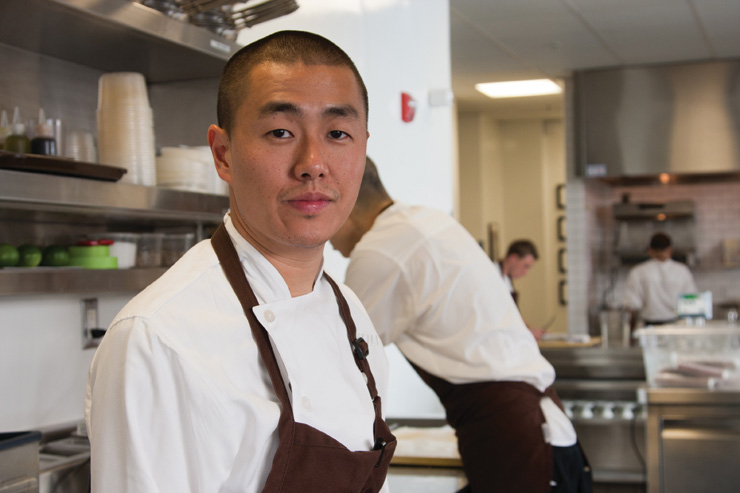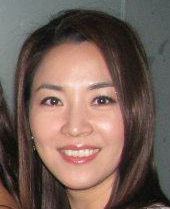Now He’s Cookin’
From picky eater to winner of the James Beard Award, chef Corey Lee is scaling the culinary heights.
Story and photographs by VIVIEN KIM THORP
In some ways, Corey Lee could be seen as your typical 30-something bachelor. He works hard, lives alone and keeps no perishables in his fridge (only beverages, and mostly alcohol at that). He doesn’t bother taking his shoes off when he gets home and hasn’t made breakfast in 10 years.
But then Lee, who turns 34 at the end of this year, had a James Beard Award under his belt by the time he was 28. He’s worked at Michelin-starred restaurants in the U.S. and Europe, co-authored a book with Thomas Keller, and served for more than four years as chef de cuisine at Keller’s world-renowned French Laundry in Yountville, Calif. Now, Lee is the chef and owner of his own restaurant, Benu, which opened in San Francisco in August of 2010.
Benu was given two stars by the prestigious Michelin restaurant guide on Oct. 25. It’s a major victory for the chef.
“It’s a huge honor, and the whole thing feels a bit surreal,” Lee says. “You just do what you feel is best and hope Michelin recognizes that. But that was yesterday, and today we are already going about our work like nothing happened.”
Housed in an elegant brick building in the SoMa district, a simple silver sign features the restaurant’s name, which means “phoenix” in Egyptian. Lee picked the name as much for its meaning and sound, as for its hard-to-determine origins. The restaurant’s facade boasts large windows where passersby can stare into the bright and busy kitchen. Here, sous vide machines (which utilize a method that combines the steady heat of poaching and an airtight seal) bubble up perfectly poached sea cucumbers, and staff members meticulously slice duck flesh and patiently weigh dumpling skins, a pair at a time.
The dining room, in contrast, is dim and serene, representing a kind of understated luxury, with a neutral palette and spare modern art. It’s here that Lee nightly serves a brand of cuisine strictly his own, drawn from his more than 16 years of experience, as well as the Asian foods he loves to eat. A dish of oysters, pork belly and kimchi may find itself in the company of a fois gras-filled Chinese dumpling. Flavors such as the Japanese citrus yuzu sit alongside watercress and apples. Lee’s food is creative, complex and lauded by his peers, including Momofuku’s David Chang, who, ironically, is often quoted as a critic of the San Francisco food scene. In January, the New York Times declared Benu one of “10 Restaurants Worth a Plane Ride,” and an early October Wall Street Journal article named it a restaurant to watch in its predictions of the world’s next star dining experiences.

Lee, whose Korean name is Dong Min, was born in Seoul in 1977. At the age of 4, he moved to New York with his family for his father’s work as an engineer. After eight years in the States, the elder Lee decided to move back to South Korea.
The move made sense for Lee’s two older sisters, who would eventually attend university there. But Lee was only 12 years old, and his parents decided it would be an awkward time to uproot him. The next few years, his mother, a graphic illustrator, went back and forth between the two countries.
“Looking back, there were things I missed out on,” he says. “But my sense of family wasn’t affected by the separation. I consider us to be very close.”
During those years, Lee would live in Manhattan, Connecticut and, eventually, New Jersey, where he graduated from Tenafly High School in 1995. It was then he would make a decision that would indirectly change his life’s direction.
Lee, who had no culinary aspirations, though an admittedly picky eater (no spicy foods!), had applied to out-of-state colleges. He began to realize that with his family in Korea, he didn’t want to split his time between Seoul and somewhere more remote. So he started the application process again, this time focusing on schools in New York. In the meantime, he got a job through a friend at Blue Ribbon Sushi in SoHo. It wasn’t long before he ended up in the kitchen.
“I got a real glimpse at the work chefs were doing,” he says. “I saw how hard they worked, and that being a chef required physical strength but also creativity and, at an extreme level, artistry.” Lee also thought the career path was a fair one, if you worked hard, you did well. Eventually, the owners took a personal interest in him, encouraging Lee to go abroad. He listened, went to London and got his first experience in the world of fine dining, working at a number of restaurants including Gordon Ramsay’s Savoy Grill. His career trajectory took off from there, with Lee climbing the ranks of elite restaurants in Europe and then New York, finally alongside Keller in California. He spent a year opening Keller’s Per Se in New York and together they co-authored Under Pressure, a book on the sous vide method of cooking.
Lee has a precise and modern approach to cooking, in which technique and research are implemented at every turn, but still take a back seat to the ingredients themselves. Though he came at his career by happy accident, Lee always had a respect for the meaning of a meal.
Some of Lee’s preferred Korean dishes include bossam (steamed pork with oysters), maneuljong (kimchi made from garlic stalks) and ganjang gejang (soy-sauce-marinated crab). But he says he can’t identify one single dish to symbolize what he loves about Korean food. “That’s not how Korean food is eaten,” he says. “It’s about balancing intense flavors with milder dishes, such as rice or noodles, not one dish.” Lee says owning his own restaurant has been a welcome experience. “In many ways, day to day, I’m still a chef in the kitchen,” he says. “But there’s a different sense of responsibility.” Before, great chefs like Keller entrusted their vision to him, which almost felt like a bigger responsibility to him, he says.
But now he gets to experiment more freely. “On your own, you can take more liberties,” he says. “It’s your own reputation at stake.” Still, Lee is well aware that along with his own success and that of his business partners, he has 34 employees and their families to whom he is beholden. He’s had spare time for hobbies such as golf, and when he reads, it usually reflects his industry. Lee says he feels incredibly fortunate to have had the opportunity to open his own restaurant, which is booked every night.
The a la carte menu changes according to season and the chef’s inspiration. The tasting menu, an intricate affair of paired textures, flavors and even aromas, changes less often. Currently, three dishes have remained on the menu since the restaurant opened: the silky-textured monkfish liver, various takes on the 1,000-year-old egg and a faux shark fin soup, which is Lee’s interpretation of the iconic Chinese dish.
The chef says coming to the U.S. as a kid greatly influenced his perspectives on food. “I was young, but still old enough to recognize that we ate differently from most people around us,” he says. “My understanding of food was about the critical role it plays in identity and culture. Food is more than sustenance and nutrition. It’s part of who you are.”
This article was published in the November 2011 issue of KoreAm.








